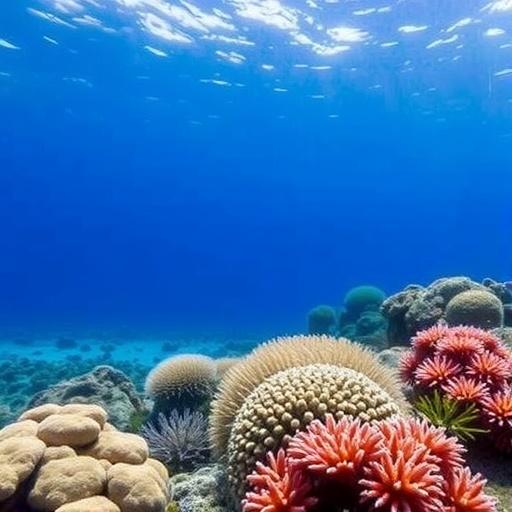Recent studies have revealed that climate change poses a significant threat to marine ecosystems, leading to alarming consequences for coral populations around the globe. Among these, the species Cladocora caespitosa, a key reef-building coral, stands out due to its ecological significance and vulnerability to environmental changes. In a groundbreaking study led by researchers including Quintano, Linares, and Ramon-Cortés, published in Coral Reefs, new insights are provided into how nutrient regimes influence mortality patterns within warming-impacted Cladocora caespitosa populations.
The study underscores an emerging concept in marine biology: nutrient dynamics play a critical role in shaping the responses of coral species to climate-induced stressors. Traditionally, it has been established that rising sea temperatures directly contribute to coral bleaching, a phenomenon that can decimate coral cover and disrupt entire reef ecosystems. However, this research illuminates the often-overlooked aspect of nutrient availability and its interaction with thermal stress.
Corals are not isolated entities; they exist within complex ecosystems where nutrient levels fluctuate due to various factors, including runoffs from land, variations in ocean currents, and anthropogenic activities. In this context, the researchers aimed to understand how these changing nutrient regimes can either exacerbate or alleviate the negative impacts of rising temperatures on Cladocora caespitosa, particularly in Mediterranean marine ecosystems. The findings from their research provide critical implications for conservation strategies tailored to the inherent complexities of coral reef ecosystems facing climate change.
Through a series of meticulously designed experiments, the researchers evaluated how varying nutrient concentrations—the levels of nitrates and phosphates—affected the health and survival of Cladocora caespitosa when exposed to elevated temperatures. What emerged from their investigation was a clear relationship between nutrient availability and coral resilience, indicating that nutrient-enriched environments could lead to increased mortality rates in corals subjected to significant warming.
In their experiments, the team observed that corals were significantly more susceptible to heat stress at elevated nutrient levels compared to those in low-nutrient settings. This counterintuitive finding addresses the notion that more nutrients may benefit corals by promoting growth, thereby raising a red flag about the nuanced impacts of nutrient pollution often associated with coastal development and agricultural runoff.
Moreover, the researchers found that the mechanisms driving these mortality patterns were intricately tied to the physiological responses of corals to both temperature and nutrient stress. As corals experience heating, their energy allocation shifts, prioritizing basic survival functions over growth and reproduction. The higher concentrations of available nutrients, therefore, may contribute to stress-induced pathologies that render corals less capable of withstanding the thermal assaults brought on by climate change.
The implications of this research are far-reaching, especially when considering the management of coral reefs exposed to urban runoff and agricultural practices that increase nutrient input into marine ecosystems. The findings call for a reevaluation of current conservation strategies that focus primarily on controlling temperature increases, emphasizing instead the need to monitor and regulate nutrient loads entering these vital marine environments.
By articulating the complex interplay between thermal and nutrient stress, this study also opens avenues for future research aimed at deciphering the adaptive capacities of various coral species to environmental changes. Understanding the thresholds of nutrient loading that corals can withstand may prove crucial in the face of ongoing climate challenges.
The urgency of addressing these environmental stressors cannot be overstated. Rising sea temperatures and excessive nutrient input are anticipated to become more pronounced in the coming decades, with potentially devastating consequences for coral communities worldwide. As such, collaborative international efforts aimed at regulating nutrient pollution, alongside commitments to mitigate climate change, are essential for preserving these invaluable ecosystems.
In light of these findings, researchers call upon policymakers, conservationists, and the public to recognize the pivotal role that nutrient dynamics play in coral resilience. Raising awareness and fostering initiatives that promote sustainable land-use practices could significantly mitigate the adverse impacts of nutrient pollution on marine life.
As the marine environment continues to evolve under the pressures of climate change, understanding and addressing the complex interactions between nutrient dynamics, temperature changes, and coral health will be paramount. Future strategies must be holistic, integrating scientific findings with conservation efforts to ensure the survival of corals like Cladocora caespitosa for generations to come.
In conclusion, the research conducted by Quintano and colleagues provides a vital understanding of how nutrient regimes influence the survival of coral populations undergoing thermal stress. It challenges existing paradigms regarding coral health, emphasizing the necessity of adopting multifaceted approaches toward environmental management. By embracing these insights, we can better equip our oceans to withstand the dual threats of climate change and nutrient enrichment.
Subject of Research: Nutrient regimes and their impact on coral mortality in warming-impacted ecosystems.
Article Title: Nutrient regimes shape mortality patterns in warming-impacted Cladocora caespitosa populations.
Article References:
Quintano, N., Linares, C., Ramon-Cortés, A. et al. Nutrient regimes shape mortality patterns in warming-impacted Cladocora caespitosa populations.
Coral Reefs (2025). https://doi.org/10.1007/s00338-025-02711-z
Image Credits: AI Generated
DOI: 10.1007/s00338-025-02711-z
Keywords: Coral reefs, Cladocora caespitosa, nutrient dynamics, climate change, mortality patterns.




